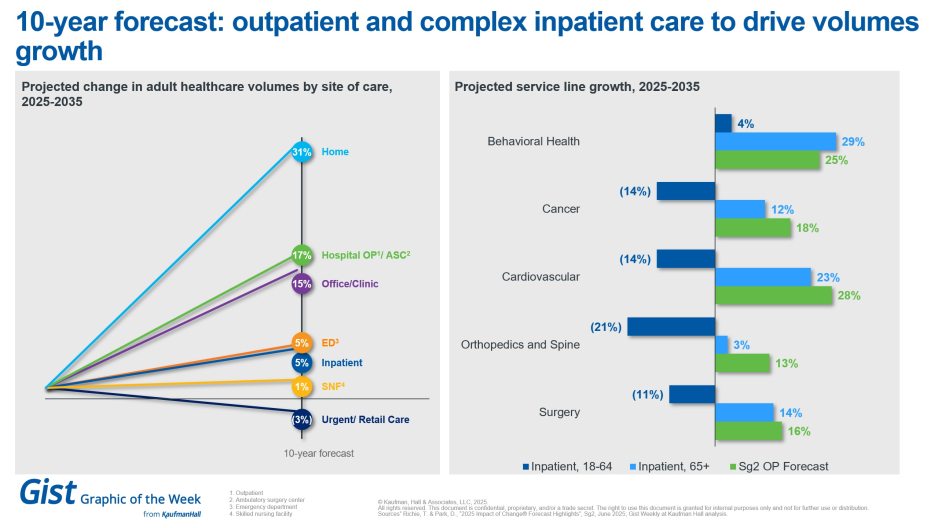Hello, and welcome back to this week’s edition of the Gist Weekly. We immensely appreciate your continued readership and invite you to forward this email to friends and colleagues—please encourage them to subscribe.
In the News
What happened in healthcare recently—and what we think about it.
- Senate parliamentarian takes issue with proposed healthcare cuts in One Big Beautiful Bill. The nonpartisan Senate parliamentarian on Thursday threw a wrench into the gears of President Trump’s One Big Beautiful Bill (OBBB). The parliamentarian advised that an estimated $250 billion of the $863 billion in the bill’s proposed Medicaid-related cuts would not comply with budget reconciliation rules and, as such, would be subject to a 60-vote threshold. These provisions include proposed changes to state provider taxes, a ban on Medicaid coverage of gender-affirming care and the prohibition of Medicaid coverage for certain non-citizens. The parliamentarian has not yet completed her review of the bill, including the tax cuts at its center. Congress and the president have hoped to finalize the bill by July 4.
- The Gist: This setback means Republicans must develop alternate language that does comply with budget reconciliation, leave more of the OBBB unpaid for, or find other ways to offset the cost of the bill—which may or may not end up being healthcare-related. Both the House and Senate versions of the OBBB, if passed, would lead to immense coverage losses. Regardless of the path Republican leadership takes, Congress still faces challenges to passing the bill. Three Republican senators have criticized the Medicaid cuts, and four conservative senators are skeptical that the spending cuts are sufficient. Sixteen House members also sent a letter to members of congressional leadership criticizing the Senate’s version of the bill, and other House members expressed regret after voting for it. Until this is resolved, the uncertainty around Medicaid may persist.
- Payers pledge to change prior authorization practices. Nearly 50 health insurance companies pledged to reform their prior authorization practices on Monday. Some of these commitments include reducing the number of claims subject to prior authorization, allowing prior authorizations from other payers should a patient switch insurance plans and establishing a standard electronic prior authorization process. Health plans committed that all prior authorization denials based on clinical reasons will be reviewed by a medical professional beginning immediately and promised to fulfill the other pledges by 2027. Health and Human Services (HHS) Secretary Robert F. Kennedy Jr. and Centers for Medicare & Medicaid Services Administrator Dr. Mehmet Oz met with industry leaders the day of the payers’ announcement and lauded the pledge.
- The Gist: This is not the first time payers have promised to change their prior authorization practices in recent years. Medicare Advantage prior authorizations have increased in prevalence since 2019. However, should these payers stick to their word, this could be a gamechanger for providers. Administrative burdens, particularly prior authorizations, are prominent drivers of burnout among clinicians. The Trump administration appears to be adopting a similar strategy to its approach to nutrition: encourage the big players to change on their own rather than impose regulations. However, if payers drag their feet, the government does seem open to changing tactics.
- ACIP meets amid scrutiny. The Advisory Committee on Immunization Practices (ACIP) met this week and recommended only the use of single-dose seasonal flu vaccines without thimerosal. The meeting comes amid backlash to Secretary Kennedy’s decision to fire all 17 members of the panel and appoint new members. On Thursday, the committee voted to recommend the use of RSV for infants but advised against flu vaccines with thimerosal, despite evidence indicating that the mercury-based preservative is not harmful at the level included in vaccines. The Centers for Disease Control and Prevention (CDC) still has to approve the recommendation.
- The Gist: Amid the uncertainty surrounding ACIP, new groups such as the Vaccine Integrity Project at the University of Minnesota are emerging to review vaccine safety and efficacy. The industry finds itself in a new predicament as new actors emerge to fill a perceived gap, leaving the public unsure about whom to trust. Sen. Bill Cassidy (R-LA), who provided a critical vote in favor of Kennedy’s confirmation as HHS Secretary, appears frustrated and is showing his strongest break with Secretary Kennedy as he questioned the credentials and biases of the new ACIP members. “Although the appointees to ACIP have scientific credentials, many do not have significant experience studying microbiology, epidemiology or immunology… some lack experience studying new technologies such as mRNA vaccines, and may even have a preconceived bias against them,” Cassidy said. He also expressed concern about the meeting occurring without a complete committee and without a confirmed CDC director.
Plus—what we’ve been reading.
- A rural community builds a hospital. Published earlier this month in The Atlantic, this article tells the unlikely story of Riverton Medical District, a rural not-for-profit hospital in Wyoming built by its own community. Set against the backdrop of rural hospital closures, consolidation and staffing shortages, the article details the story of physician Roger Gose, who moved to the community in the 1970s, and his work to mobilize residents to build a hospital. The grassroots effort began in 2018 and included a $150,000 feasibility study, significant community and tribal support and a $37 million rural development loan from U.S. Department of Agriculture, the largest ever for the state from the agency.
- The Gist: While not a scalable solution for all rural hospitals, the Riverton Medical District case underscores what can be achieved with the stewardship of physician champions, community engagement and activation and interdisciplinary partnerships. For nearly 20% of the U.S. population living in rural communities, accessing healthcare is challenging. Patients in rural communities have lower access to reliable transportation and the Internet, compounding the obstacles they face due to hospital closures, clinician shortages, reduced health services and funding cuts. The loss of services isn’t solely due to cuts, as this article highlights. Rural hospitals often have comparatively low volumes, so many of them routinely transfer higher-acuity patients to hospitals more accustomed to handling complex cases. They do have a few options to navigate these pressures, such as seeking Rural Emergency Hospital status, merging with a larger health system or selling to a private-equity partner, but rural hospitals continue to face unique challenges in a difficult financial environment.
Graphic of the Week
A key insight illustrated in infographic form.
Outpatient and complex inpatient care driving volumes through 2035
This week’s graphic features an analysis from the Impact of Change report published by Sg2, a Vizient company, earlier this week. The report found that home-based care, outpatient services (including ambulatory surgery centers) and clinics are projected to be the fastest-growing care sites over the next decade, with volumes increasing 31%, 17% and 15%, respectively. Sg2 forecasts that emergency departments, inpatient facilities and skilled nursing facilities will experience more modest volume increases, and retail care volumes will decline. While inpatient volumes are projected to rise, this growth will largely be driven by a demand increase in inpatient care among patients 65 and older, who typically require more complex care and resources. Additionally, although the initial outpatient procedural shift was largely focused on orthopedics, the next wave of outpatient volume growth will come from other service lines. Driven by regulatory changes and by patient demand, outpatient cardiovascular volumes are expected to increase by 28% over the next decade, closely followed by behavioral health at 25%. Continued health system investment in higher-acuity outpatient care remains crucial.

This Week at Kaufman Hall
What our experts are saying about key issues in healthcare.
Like many aspects of health system management, patient access is a fragmented process. Access in many systems is a distributed operation that occurs across multiple pieces of the system, often resulting in a frustrating labyrinth that patients are left to navigate alone.
In a new article, Bonnie Proulx and Forest Plourde-Cole address the need for health systems to help patients escape this labyrinth by establishing a dedicated patient access leader: one who is responsible, and accountable, for making sure that patients can easily make and keep appointments and return for follow-up. Health systems that treat access as a leadership function, not just a logistics challenge, will be better positioned to deliver seamless, efficient, patient-centered care.
On Our Podcast
The Gist Healthcare Podcast—all the headlines in healthcare policy, business, and more, in ten minutes or less every other weekday morning.
On Monday, June 16, we heard host J. Carlisle Larsen’s conversation with Sylvia Owusu-Ansah, M.D., associate professor of pediatrics and emergency medicine at the University of Pittsburgh School of Medicine and director of emergency medical services at UPMC Children’s Hospital-Pittsburgh. Dr. Owusu-Ansah recently served as a medical consultant on the hit HBO Max series The Pitt and tells JC about her experience.
This coming Monday, JC speaks with Stefanie Reed, D.O., pediatric hospitalist and Medical Director of Atrium Health Levine Children's Hospital, about its first-in-the-nation pediatric hospital-at-home program.
To stay up to date, be sure to tune in every Monday, Wednesday and Friday morning. Subscribe on Apple, Spotify, Google or wherever fine podcasts are available.
The Gist Weekly will be off next week in observance of the Fourth of July holiday. We look forward to delivering the latest industry insights on July 11. In the meantime, check out our Gist Weekly archive if you’d like to peruse past editions. We also have all of our recent “Graphics of the Week” available here.
Best regards,
The Gist Weekly team at Kaufman Hall








